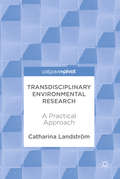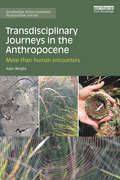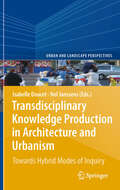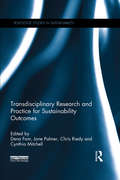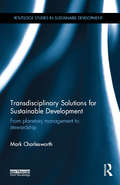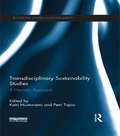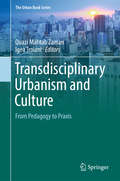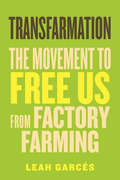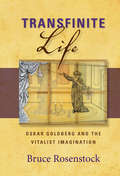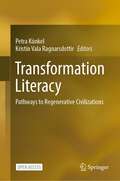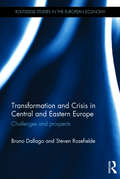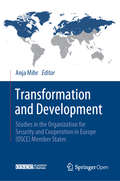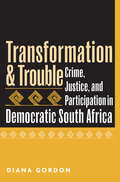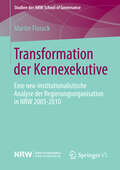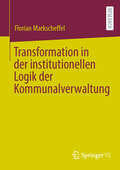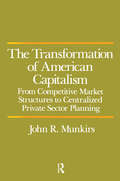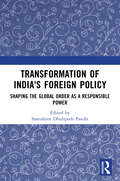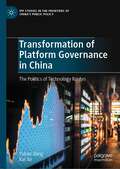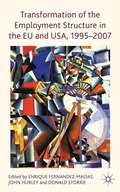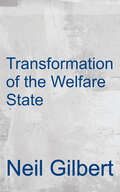- Table View
- List View
Transdisciplinary Environmental Research: A Practical Approach
by Catharina LandströmThis book explores the practice of transdisciplinary research through the narratives of different individuals taking part in a project investigating local water management. The research project ran for one year and brought seven university scientists together with seven local residents to explore relationships between water quantity, water quality, abstraction of water resources and how to reduce pollution.Landström presents three conversations that convey the experience of transdisciplinary practice in natural language in order to offer insights into the workings of a transdisciplinary Environmental Competency Group. The conversations highlight Environmental Competency Groups as tools enabling collaboration between knowledgeable individuals who do not share a common scientific vocabulary.Transdisciplinary Environmental Research will appeal to natural and social scientists interested in working collaboratively with each other and the general public on environmental research projects.
Transdisciplinary Journeys in the Anthropocene: More-than-human encounters (Routledge Environmental Humanities)
by Kate WrightTransdisciplinary Journeys in the Anthropocene offers a new perspective on international environmental scholarship, focusing on the emotional and affective connections between human and nonhuman lives to reveal fresh connections between global issues of climate change, species extinction and colonisation. Combining the rhythm of road travel, interviews with local Aboriginal Elders, and autobiographical storytelling, the book develops a new form of nature writing informed by concepts from posthumanism and the environmental humanities. It also highlights connections between the studied area and the global environment, drawing conceptual links between the auto-ethnographic accounts and international issues. This book will be of great interest to scholars and postgraduates in environmental philosophy, cultural studies, postcolonial theory, Australian studies, anthropology, literary and place studies, ecocriticism, history and animal studies. Transdisciplinary Journeys in the Anthropocene may also be beneficial to studies in nature writing, ecocriticism, environmental literature, postcolonial studies and Australian studies.
Transdisciplinary Knowledge Production in Architecture and Urbanism
by Isabelle Doucet Nel JanssensThe volume addresses the hybridisation of knowledge production in space-related research. In contrast with interdisciplinary knowledge, which is primarily located in scholarly environments, transdisciplinary knowledge production entails a fusion of academic and non-academic knowledge, theory and practice, discipline and profession. Architecture (and urbanism), operating as both a discipline and a profession, seems to form a particularly receptive ground for transdisciplinary research. However, this specificity has not yet been developed into a full-fledged, unique mode of knowledge production. In order to dedicate specific attention to transdisciplinary knowledge production, this book aims to explore (new) hybrid modes of inquiry that allow many of architecture's longstanding schisms to be overcome: such as between theory/history and practice, critical theory and projective design, the adoption of an external viewpoint and a view-from-within (often under the guise of bottom-up vs. top-down). It therefore offers the reader a mix of contributions that elaborate on knowledge production that is situated in the (architectural and urban) profession or practice, and on practice-based approaches in theory.
Transdisciplinary Research and Practice for Sustainability Outcomes (Routledge Studies in Sustainability)
by Dena Fam, Jane Palmer, Chris Riedy and Cynthia Mitchell‘Transdisciplinarity’ is a form of research and practice that synthesises knowledge from a range of academic disciplines and from the community. There is now global interest and a significant body of work on transdisciplinarity and its potential to address the apparently intractable problems of society. This creates the opportunity for a specific focus on its practical application to sustainability issues. Transdisciplinary Research and Practice for Sustainability Outcomes examines the role of transdisciplinarity in the transformations needed for a sustainable world. After an historical overview of transdisciplinarity, Part I focuses on tools and frameworks to achieve sustainability outcomes in practice and Part II consolidates work by a number of scholars on supporting transdisciplinary researchers and practitioners. Part III is a series of case studies including several international examples that demonstrate the challenges and rewards of transdisciplinary work. The concluding chapter proposes a future research pathway for understanding the human factors that underpin successful transdisciplinary research. As Emeritus Professor Valerie Brown AO notes in her Preface, this book moves transdisciplinary inquiry into the academic and social mainstream. It will be of great interest to researchers and practitioners in the fields of sustainability, qualitative research methods, environmental impact assessment and development studies.
Transdisciplinary Solutions for Sustainable Development: From planetary management to stewardship (Routledge Studies in Sustainable Development)
by Mark CharlesworthGlobal environmental issues such as climate change and species loss are intensifying despite our best efforts to combat them. The key reason for this is that the drivers of these problems are closely linked to the industrialism and consumerism that are promoted by governments and other organizations the world over. This innovative book identifies the key issues that block progress in sustainable development and proposes transdisciplinary solutions. Presenting a review of the epistemology and ethics of this policy field including current policy responses, it examines the ethical and policy implications from a multidisciplinary perspective. The book explains the current limitations of scientific prediction for global environmental issues and develops innovative approaches to respond to these difficulties, drawing out lessons that will make sustainable development policy more democratic, plural and open. This book will be of great interest to students and researchers in environmental policy, development studies, politics, economics and sustainable development.
Transdisciplinary Sustainability Studies: A Heuristic Approach (Routledge Studies in Sustainability)
by Katri Huutoniemi Petri TapioArising out of human-environment interaction, sustainability problems resist disciplinary categories and simple solutions. This book offers a fresh approach to practical and methodological concerns in transdisciplinary environmental and sustainability studies. It illustrates methodological means by which researchers, professionals, and decision-makers can address complex environmental issues. While scientific reasoning is mostly guided by disciplinary traditions, transdisciplinary research rests on other cognitive strategies. As it does not have a ready-made stance toward problems, figuring out what the puzzle is and what the answer might look like are crucial aspects of transdisciplinary inquiry. Through examples from environment and sustainability studies, the volume discusses heuristic schemes that can give structure to this exploration. By focusing on heuristics, rather than on methods, concepts, or general guidelines, the book argues that a problem-centered approach often resists the rigor of methodology. Learning from experience provides valuable “rules of thumb”, checklists, and other cognitive schemes for making ill-defined problems more tangible. Written by an international team of authors, the chapters draw examples from dealing with issues in environmental protection, transport and climate policy, ecosystem services and disservices, environmental beliefs and attitudes, and more. Together with more theoretically oriented chapters, they show that the intellectual processes needed to tackle complex sustainability problems are as much about heuristic problem solving as they are about methodical work.
Transdisciplinary Urbanism and Culture
by Quazi Mahtab Zaman Igea TroianiThis book presents a collection of critical, multi-disciplinary essays on urban research by established and early career researchers who participated in the 9th Annual AHRA (Architectural Humanities Research Association) Research Student Symposium. The symposium was held at the Scott Sutherland School of Architecture and Built Environment, Robert Gordon University in Aberdeen from Saturday 19th May to Sunday 20th May 2012. The authors highlight contemporary research issues in urban development in search of new and fresh approaches that reflect the changing principles and praxis of urban conditions. The common ambition is to create new lines of knowledge in urban research. Due to socio-economic, political and technological changes to urban production and patterns of consumption, and a drive for inter-, cross-, multi- and transdisciplinary practice, the essays also reflect the ideological shift currently underway in academic faculties and external research organisations.
Transfarmation: The Movement to Free Us from Factory Farming
by Leah GarcésThe story of factory farmers, rescued farm animals, and rural communities standing up to big corporations and constructing their own new world that will change the way we eatIn Transfarmation, president and CEO of Mercy For Animals Leah Garcés explains how food and farming policies have failed over decades and offers insights into the wave of change coming from a new crop of farmers and communities who are constructing a humane and sustainable farming system. Factory animal farming faces an abundance of issues—from environmental concerns and animal cruelty, to exploited farmers and poor working conditions—and more and more farmers are searching for a way out and for a new start.Using insights from interviews and fieldwork, Garcés shares the perspectives of three groups:—Farmers—such as the Halley farm, where a family crushed by chicken factory farming builds a new way by transitioning their farm to growing hemp and rescuing dogs.—Animals—like Norma, an industrial dairy cow who was sentenced to death after injuring a worker in an effort to protect her calf.—Farm communities—including stories like how the hog industry in North Carolina preys on historically Black communities by contaminating the air and water for decades with hog pollution.Garcés demonstrates the reasons why we must end factory farming and calls on readers to imagine a future world where Transfarmation is complete and we have transitioned to a just food and farming system.
Transfer künstlerischer Handlungskonsequenz in Bildungs- und Arbeitsprozesse
by Dido RoggatzDieses Buch verdeutlicht das Potenzial künstlerischer Erfahrungen durch die vollständige Identifikation mit dem eigenen Tun und einer Expertise in eigenverantwortlichen Prozessen – essenzielle Faktoren für Bildung und Arbeitswelt. Neben neuen Handlungsoptionen stärkt das gewonnene Vertrauen in die eigene Handlungskompetenz eine Flexibilität und Offenheit gegenüber unerwarteten Situationen. Die Publikation richtet sich an Entscheidungsträger:innen und Fachkräfte aus Bildung, Forschung und Wirtschaft. Es bietet praxisnahe Ansätze zur Förderung einer zukunftsfähigen Gesellschaft.
Transfer of Power (A Mitch Rapp Novel #3)
by Vince FlynnThis &“roller-coaster, edge-of-your-seat thriller&” (Star-Tribune, Minneapolis) in the #1 New York Times bestselling Mitch Rapp series follows the CIA&’s top operative as he must stop a massacre in Washington, DC, and save the president before terrorists reach the White House. The stately calm of a Washington morning is shattered when a group of terrorists descends, killing dozens and taking nearly one hundred hostages as they try to infiltrate the White House. The Secret Service immediately evacuates the president to an underground bunker—and while officials argue over how best to negotiate with the enemy, Mitch Rapp, the CIA&’s top counterterrorism operative, moves stealthily among the hidden corridors and secret passageways of the nation&’s capital to save the hostages before the terrorists reach the president. But there&’s someone waiting in the wings, someone within the Washington elite, who is determined to see Rapp&’s rescue mission fail. With heart-pounding thrills and feverish pacing, Transfer of Power &“mixes in a spicy broth of brutal terrorists, heroic commandos, and enough secret-agent hijinks to keep the confrontation bubbling until its flag-raising end&” (Publishers Weekly).
Transfer von Innovation und Wissen: Gelingensbedingungen und Herausforderungen
by Uwe Schmidt Katharina SchönheimOb und wie Ideen und Projekte aus Förderprogrammen an Hochschulen und in anderen Organisationen in die Breite transferiert werden, ist Gegenstand des vorliegenden Buchs. Ausgehend von einer theoretischen und methodischen Hinführung zum Thema Transfer werden Programme und Projekte vorgestellt, die sich der Übertragung innerhalb oder auch zwischen Hochschulen bzw. Organisationen widmen. Hierbei werden sowohl Herausforderungen als auch Gelingensbedingungen für Transfer in den Blick genommen. Die Praxiserfahrungen regen zum Nachmachen an.
Transferral
by Kate BlairLondon, England, present day. This is the world as we know it, but with one key difference: medical science has found a way to remove diseases from the sick. The catch? They can only transfer the diseases into other living humans. The government now uses the technology to cure the innocent by infecting criminals. It is into this world that Talia Hale is born. Now sixteen and the daughter of a prime ministerial candidate, she discovers that the effort to ensure that bad things happen only to bad people has turned a once-thriving community into a slum, and has made life perilous for two new friends. When Talia’s father makes an election promise to send in the police to crack down on this community, Talia can only think of how much worse things will be for her friends. Will she defy her father to protect them, even if it means costing him the election? Tranferral, the debut from Kate Blair, is a chilling look at a world gone wrong because of its efforts to do right.
Transferring Asylum Norms to EU Neighbours: Multi-Scalar Policies and Practices in Ukraine (The European Union in International Affairs)
by Irina MützelburgThis book analyses why the Ukrainian state established asylum laws and policies in the thirty years since 1991, even though the number of asylum seekers was very low. International and non-governmental organisations transferred international asylum norms to Ukraine. Various state and non-state actors participated in this process, translating, spreading, and resisting those norms. In many cases, legislative adoption was driven by domestic politicians’ pursuit of recognition by international organisations, such as the European Union and the Council of Europe, and by their desire to meet conditionality requirements. NGOs sought to influence administrative practices, alternating between confrontational and conciliatory, formal and informal approaches, and often relying on personal contacts. Actors used and shifted between scales in order to transfer norms or resist transfer. In the process, they produced, renegotiated, and confirmed those scales. For instance, NGOs resorting to the European Court of Human Rights to prevent refoulement placed the European scale above the national scale. This book offers a new multi-actor and multi-scalar analysis of policy transfer.
Transfinite Life: Oskar Goldberg and the Vitalist Imagination
by Bruce RosenstockOskar Goldberg was an important and controversial figure in Weimar Germany. He challenged the rising racial conception of the state and claimed that the Jewish people were on a metaphysical mission to defeat race-based statism. He attracted the attention of his contemporaries--Walter Benjamin, Gershom Scholem, Thomas Mann, and Carl Schmitt, among others--with the argument that ancient Israel's sacrificial rituals held the key to overcoming the tyranny of technology in the modern world. Bruce Rosenstock offers a sympathetic but critical philosophical portrait of Goldberg and puts him into conversation with Jewish and political figures that circulated in his cultural environment. Rosenstock reveals Goldberg as a deeply imaginative and broad-minded thinker who drew on biology, mathematics, Kabbalah, and his interests in ghost photography to account for the origin of the earth. Caricatured as a Jewish proto-fascist in his day, Goldberg's views of the tyranny of technology, biopolitics, and the "new vitalism" remain relevant to this day.
Transformation Literacy: Pathways to Regenerative Civilizations
by Petra Künkel Kristin Vala RagnarsdottirThis open access book brings science and practice together and inspires a global movement towards co-creating regenerative civilizations that work for 100% of humanity and the Earth as a whole. With its conceptual foundation of the concept of transformation literacy it enhances the knowledge and capacity of decision-makers, change agents and institutional actors to steward transformations effectively across institutions, societal sectors and nations.Humanity is at crossroads. Resource depletion and exponential emissions that not only cause climate change, but endanger the health of people and planet, call for a decisive turnaround of human civilization. A new and transformative paradigm is emerging that advocates for regenerative civilizations, in which a narrative of systemic health as much as individual and collective vitality guide the interaction of socio-economic-ecological systems. Truly transformative change must go far beyond technical solutions, and instead envision what can be termed ‘a new operating system’ that helps humankind to live well within the planetary boundaries and partner with life’s evolutionary processes. This requires transformations at three different levels:· Mindsets that reconnect with a worldview in which human agency acknowledges its co-evolutionary pathways with each other and the Earth.· Political, social and economic systems that are regenerative and foster the care-taking for Earth life support systems.· Competencies to design and implement effective large-scale transformative change processes at multiple levels with multiple stakeholders.This book provides key ingredients for enhancing transformation literacy from various perspectives around the globe. It connects the emerging practice of stewarding transformative change across business, government institutions and civil society actors with the most promising scientific models and concepts that underpin human action to shape the future collectively in accordance with planetary needs.
Transformation and Crisis in Central and Eastern Europe: Challenges and prospects (Routledge Studies in the European Economy)
by Steven Rosefielde Bruno DallagoThe global financial crisis has provided an important opportunity to revisit debates about post-socialist transition and the relative success of different reform paths. Post-communist Central and Eastern Europe (CEECs) in particular show resilience in the wake of the international crisis with a diverse range of economic transformations. Transformation and Crisis in Central and Eastern Europe offers an in depth analysis of a diverse range of countries, including Poland, Hungary, Russia, Ukraine, Czech Republic and Slovakia. This volume assesses each country’s institutional transformations, geopolitical policies, and local adaptations that have led them down divergent post-communist paths. Chapters take the reader systematically through the evolution of former communist national economic systems, before ending with lessons and conclusions for the future. Subsequent chapters demonstrate that economic performance crucially depends on achieving a sustainable balance between sound institutional design and policies on one hand, and localization on the other. This new volume from a prestigious group of academics offers a fascinating and timely study which will be of interest to all scholars and policy makers with an interest in European Economics, Russian and East European Studies, Transition Economies, Political Economy and the post-2008 world more generally.
Transformation and Development: Studies in the Organization for Security and Cooperation in Europe (OSCE) Member States
by Anja MihrThis open access book features various studies on democratization, transformation, political and economic development, and security issues in the Organization for Security and Cooperation in Europe (OSCE) geographical region and beyond. Written by experts and academics in the fields of human rights, security, transformation and development, particularly in post-soviet and communist countries, it examines the status quo of regime development in various member states of the OSCE; their economic, security and human rights performance; institutional reforms and transformations and the challenges that these countries and their societies face, including the USA, Canada, Germany, Macedonia, Russia, Turkey, Kazakhstan, Kyrgyzstan and Mongolia. This is the 2019 edition of this Compilation Series of the OSCE Academy. The OSCE works to promote Minority Protection, Security, Democratic Development and Human Rights guided by the Office for Democratic Institutions and Human Rights (ODIHR), and to enhance securitization and development policies in Eurasia, Europe, Central Asia and North America. Since being founded in 1993, the OSCE and its agencies and departments have attracted a wealth of academic research in various fields and disciplines, ranging from economic development and election monitoring to enhancing global principles of human rights and securitization.About the OSCE Academy in Bishkek: Founded in 2004, the Academy offers post-Doc research fellowships and runs two Master Degrees, one in Economic Governance and Development and one in Politics and Security in Central Asia. The Academy"s regular academic programs and conference contributes to developing human professional capital in the sectors of particular importance for Central Asian states and societies. The Academy's graduates and visiting researchers contribute to economic development, governance and policy-making in Central Asia and beyond the OSCE region. Website: http://www.osce-academy.net/en/about/
Transformation and Trouble: Crime, Justice, and Participation in Democratic South Africa
by Diana R. GordonViolence often increases after the lifting of authoritarian control, or in the aftermath of regime change. But how can a fledgling democracy fight crime without violating the fragile rights of its citizens? In Transformation and Trouble, accomplished theorist and criminal justice scholar Diana Gordon critically examines South Africa's efforts to strike the perilous balance between democratic participation and social control.
Transformation der Kernexekutive
by Martin FlorackRegieren braucht Organisation und Institutionen. Eine herausragende Rolle spielt hierbei die Kernexekutive, die Regierungshandeln koordiniert und steuert. Wie verändern sich diese formalen und informellen Institutionen nach einem Regierungswechsel? Welche Institutionen bleiben stabil, welche unterliegen grundlegendem Wandel? Wie groß ist der Einfluss politischer Akteure auf die Regierungsorganisation und welche Mechanismen liegen dem Wechselspiel institutioneller Stabilisierung und Veränderung zugrunde? Über die Beantwortung dieser Fragen hinaus verfolgt die vorliegende Studie drei weiterführende Ziele: Erstens geht es um eine empirische Analyse der Kernexekutive in Nordrhein-Westfalen. Damit rückt zugleich die bislang oftmals vernachlässigte Ebene der deutschen Länder ins Zentrum des Erkenntnisinteresses. Zweitens zielt die Studie auf eine methodische Erweiterung der Zugänge der Regierungsforschung durch die Methode der teilnehmenden Beobachtung. Die hiermit gewonnenen Innenansichten ermöglichen sowohl neue empirische als auch theoretische Perspektiven. Drittens geht es um den Anschluss des Themenfeldes an institutionalistische Theorieansätze. Die Studie zielt folglich auf einen Beitrag zu weiteren Theoriebildung im Feld der Regierungsforschung.
Transformation in der institutionellen Logik der Kommunalverwaltung
by Florian MarkscheffelDie Kommunalverwaltungen in Deutschland befinden sich in einem akuten Spannungsfeld: Der Reformdruck steigt, aufgrund diverser Herausforderungen wird eine neue Rolle gefordert, um gestaltend und moderierend auf die lokale sozial-ökologische Transformation zu wirken. Dem gegenüber steht jedoch eine fachlich wie gesellschaftlich debattierte Veränderungsresistenz der Verwaltung: Die Strukturen der Verwaltung scheinen ein Beharren auf etablierte Institutionen und Routinen zu befördern. Das vorliegende soziologische Buch adressiert diese Beharrungskräfte. Den theoretischen Rahmen stellen der Sozialkonstruktivismus sowie die institutionellen Logiken dar, empirisch wird eine Fallstudie im Modus des Transformativen Forschens mit explorierenden und narrativen Methoden ergründet. Die Stadtverwaltung der Fallstudie durchläuft einen Veränderungsprozess, der auf den Reformdruck eingeht. Im Fokus stehen die Erzählungen und Erlebnisse der Verwaltungsmitarbeitenden. Analysiert wurden die beschriebenen Institutionen und Routinen des Arbeitsalltages in der Verwaltungskultur, sowie die wahrgenommenen Herausforderungen im Change Prozess. Es zeigt sich, dass der Widerstand gegen Transformationen in der Struktur der Verwaltung verankert ist. Dementsprechendes Handeln der Mitarbeitenden wird in der institutionalen Ordnung befördert, unangemessenes Verhalten vermieden.
Transformation of American Capitalism
by John R. MunkirsDo Americans live in a planned economy? Most of us would say no. John Munkirs. however, argues that the American economy has “centralized private sector planning.” Assessing 138 major industries and 5 major market areas, the author shows how firms in a given industry are technologically, financially, and administratively interdependent. He then demonstrates how industries are both structurally and functionally interdependent and how a series of economic planning instruments evolved over the years that both allow and may even necessitate regional, national, and international private sector planning.
Transformation of India's Foreign Policy: Shaping the Global Order as a Responsible Power
by Santishree Dhulipudi PanditAnalysing the trajectory of Indian foreign policy through Prime Minister Narendra Modi’s vision, this book examines issues related to India’s growing profile at global multilateral forums, economy and trade, soft power, diaspora, and the intersection between foreign policy and national security. The subject matter in this book assesses Indian foreign policy by covering seven broad domains: security, multilateralism, economy and trade, diaspora, climate change, science and technology, and soft power. In addition, it also examines the notable achievements of Indian foreign policy over the past decade, describes Prime Minister Modi’s worldview and how it has been implemented; analyses the changes Modi has brought to Indian foreign policy behaviour and conduct; studies the evolution of Indian foreign policy over the last decade; and explores the new opportunities that could be potentially exploited in the future.Print edition not for sale in South Asia (India, Sri Lanka, Nepal, Bangladesh, Pakistan and Bhutan)
Transformation of Platform Governance in China: The Politics of Technology Routes (IPP Studies in the Frontiers of China’s Public Policy)
by Yuhao Jiang Kai JiaThe admiration of science and technology and the emphasis on political stability are two sides of the same coin in China. Therefore, China is more likely to take aggressive measures to promote or inhibit platform development than the United States and the European Union. But the uncertainty in the decision-making process is worrisome and calls for a broader discussion of the multiple political consequences of technology.
Transformation of the Employment Structure in the EU and USA, 1995–2007
by Enrique Fernández-Macías John Hurley Donald StorrieThis collection describes the changing structure of employment during the period of robust employment expansion that preceded the credit crunch and features contributions from a team of leading labour market researchers from Europe and the United States.
Transformation of the Welfare State: The Silent Surrender of Public Responsibility
by Neil GilbertSince the early 1970s, debate has raged over the "crisis of the welfare state." As the United States successfully exported its bootstrap brand of capitalism and an ever-broadening range of public activity came to be viewed through the prism of profit and loss, social welfare policies were closely scrutinized worldwide. Welfare was no longer seen as a means to remedy the inherent flaws of capitalism, but rather was recast as part of the very problem it was designed to solve. At the same time, the glaring systemic deficiencies of extant welfare systems-and the psychological toll of welfare dependency--became increasingly apparent, even to welfare's supporters. How much has really changed in the world of welfare? A great deal, according to Neil Gilbert, one of our most deeply engaged and thoughtful analysts of social welfare policy. <p><p>In this panoramic inquiry, Gilbert spans the globe to assess, in provocative yet dispassionate fashion, what welfare looks like in a free market world. From Sweden to the U.S., Gilbert finds a fundamental transformation in the welfare state--a turn away from broad-based entitlements and automatic benefits to a new, "enabling" approach defined by policies designed to promote privatization and labor force participation. He provides tangible evidence of how these new systems promote work and responsibility over protection and how they thicken the glue of civil society by diluting the pervasive role of government.
